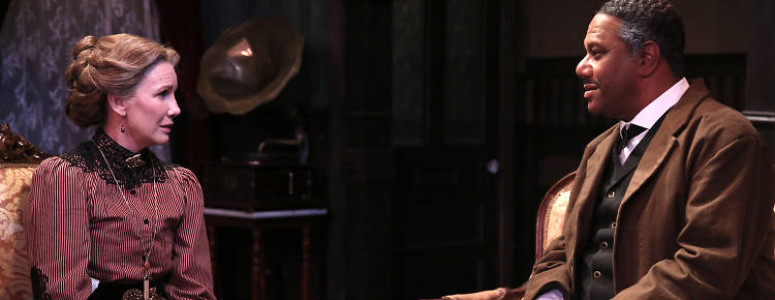We’ve all had the experience.
We get the chance to see a former lover, one we haven’t seen in years.
We agree to meet.
Why?
Does one of us hope to restart the affair?
Do both?
Or does he or she just want to be – horrors! – “friends”?
After five minutes, do you wish you hadn’t made this date?
After ten minutes, are you back in bed?
Playwright Thomas Klingenstein knows how to make his characters play a good game of cat-and-mouse in his new drama IF ONLY …
It’s at The Cherry Lane Theatre’s tiny Studio Space, so you do feel as if you’re almost with Ann Astorcott and Samuel Johnson in her turn-of-the-last-century living room.
The two haven’t seen each other in 36 years – shortly after they were introduced by, of all, people, Abraham Lincoln.
Since then, Ann has married Henry Astorcott, with whom she’s not quite in sync: Henry wants her to choose a present for her upcoming birthday while Ann tells him she prefers to be surprised. Henry, played in secure fashion by Richmond Hoxie, sees no sense in buying her a gift she’ll only return.
Klingenstein gives both characters good reasons for their opinions; he’s not interested in having us side with one and not the other.
Then Henry, about to leave for a committee meeting, makes clear that he isn’t threatened by her impending visitor.
Ann wonders if her morality will be.
Klingenstein is nice-and-slow in the way he reveals to us that the two were once romantically linked. What makes the situation all the more potent is that Ann is white and Samuel is black.
And the play is set in 1901.
Samuel walks right the through the front door, reminding us that there was a time when some people didn’t bother with locks and keys. His matter-of-fact entrance also suggests that he believes he’ll feel right at home with Ann.
Klingenstein knows how to write subtext. As the two chat, Samuel shows that he’s all for technological progress (meaning cars and telephones) while Ann pooh-poohs any new-fangled invention. Having her disagree so early and often is a smart way of her saying “We’re no more in sync than my doting husband and I are.”
It’s a play in which the interest accelerates. Truth to tell, though, IF ONLY … starts poorly: Ann reads aloud a long passage while facing not us, but a stage-left brick wall.
First off, who reads aloud at home? It’s a tired and unconvincing way of handling exposition.
For a moment or two, we might assume that Ann is speaking to Sophie (the cute Korinne Tetlow), who’s also in the room. The six-year-old doesn’t speak because she’s been traumatized by the sudden loss of both parents; thus Ann has given her refuge. But if Ann is speaking to Sophie, why doesn’t she face her instead of a brick wall?
Cynics might argue that you might as well just talk to a brick wall as to the silent Sophie. No, this is Christopher McElroen’s directorial decision and a bad one.
What’s more lamentable is that we only see Ann’s profile here and for the rest of the play, we’ll see not much more of her face. The same goes for Samuel. McElroen hasn’t erred in the way he’s staged it. The play virtually demands that we see only their profiles – her left, his right – for they sit opposite each other in formal chairs separated by a gulf of a coffee table. Neither he nor she wants to impinge on the other.
Each starts off conservatively, full of good manners, not daring to even glance at what’s behind that coffee table. It’s an inviting couch and both of them (as well as we) wonder if they’ll ever move to it – or beyond.
Melissa Gilbert, late of LITTLE HOUSE ON THE PRAIRIE, now does extraordinarily well in this Little Apartment in the City. It’s a role that would have gone to Frances Sternhagen 20 or 30 years ago, and she would have done splendidly by it. However, she wouldn’t be any better than Gilbert is now. In creating an early 20th century woman of leisure who works hard to keep a manhole-sized lid on her feelings, Gilbert never falters and always excels.
Samuel must be erudite (“Do I have your permission to mix metaphors?” … “The world needs an ode to prepositions”) as well as sensitive. McElroen found the right man in Mark Kenneth Smaltz. He has, as bar-mitzvah attendees enjoy saying, “Lovely diction.” Ann says at one point that she suspects he’s a good teacher, and we do, too.
But what shall it profit a man if he shall gain a good job and lose his own soulmate? That observation may suggest that what IF ONLY … wants to convey is that if only Ann and Samuel had seized their chance at happiness long ago, they’d be better off than they are right now.
No: Klingenstein has more to say than that. This seemingly small play turns out to deliver a big, thought-provoking message. If only other plays could do that as well.




